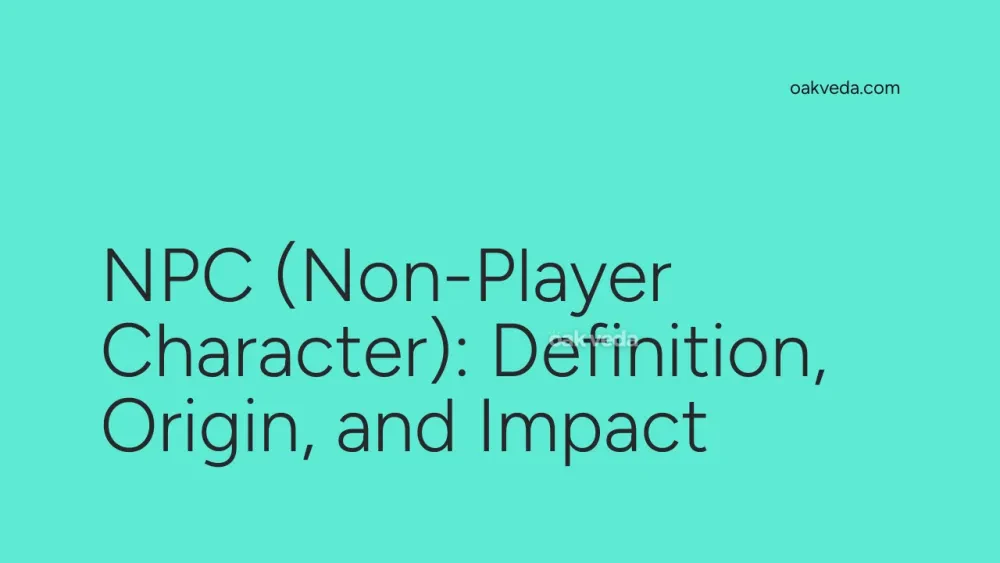
What is NPC?
NPC, which stands for Non-Player Character, is a term that has transcended its original gaming context to become a popular metaphor in social media discourse. In the realm of social media, an NPC refers to someone who is perceived as lacking independent thought or blindly following trends and popular opinions without critical thinking.
Origin and Development of NPC
The term NPC originates from the world of video games, where it describes characters controlled by the game's artificial intelligence (AI) rather than human players. These characters often have predetermined behaviors, limited dialogue options, and follow scripted routines within the game world.
As social media platforms became hotbeds for discussions on various topics, including politics and social issues, the term NPC found its way into online debates. It evolved from a gaming term to a metaphor used to describe people who seem to lack original thoughts or opinions.
How NPC Works in Social Media Context
In social media discussions, labeling someone as an NPC implies that they:
- Conform to societal or political ideologies without questioning them
- Repeat popular opinions or talking points without adding original insights
- Seem to have a limited range of responses, similar to programmed game characters
- Lack the ability to engage in nuanced or critical thinking about complex issues
The term is often used dismissively to undermine someone's arguments or perspectives, suggesting that their views are not their own but rather "programmed" by external influences.
Popular Examples of NPC Usage
The NPC concept gained significant traction on social media platforms through memes and viral content. Some popular examples include:
- The "NPC Wojak" meme: A simplified, grey-faced cartoon character used to represent people perceived as unthinking or conformist
- "NPC dialogue" memes: Images or videos mimicking repetitive, simplistic responses of video game NPCs applied to real-world scenarios
- Hashtags like #NPCMeme or #NPCArmy: Used to share and categorize content related to the NPC concept
Impact of NPC on Social Media Culture
The proliferation of the NPC term has had several effects on social media culture:
-
Polarization: The use of NPC as a pejorative term can increase division in online discussions, further polarizing different ideological groups.
-
Dehumanization: Labeling others as NPCs can lead to dehumanization, making it easier to dismiss opposing viewpoints without engaging in meaningful dialogue.
-
Meme Culture: The NPC concept has contributed to the growth of meme culture, spawning numerous variations and adaptations across different platforms.
-
Critical Thinking Awareness: While controversial, the term has sparked discussions about the importance of critical thinking and forming independent opinions.
Controversies Surrounding NPC
The use of NPC as a metaphor in social media has been the subject of several controversies:
-
Political Weaponization: The term has been used by various political groups to discredit opponents, leading to accusations of it being a form of political propaganda.
-
Ethical Concerns: Critics argue that the NPC label promotes a harmful, reductionist view of human cognition and social interaction.
-
Platform Responses: Some social media platforms have taken action against NPC-related content, citing concerns about targeted harassment and dehumanization.
How Brands and Influencers Use NPC
While the term NPC is often used in a negative context, some brands and influencers have found ways to incorporate the concept into their social media strategies:
-
Self-Aware Humor: Some brands use NPC-related humor to appear relatable and in touch with internet culture.
-
Encouraging Engagement: Influencers might challenge their followers to "prove they're not NPCs" by sharing unique thoughts or perspectives.
-
Social Commentary: Some content creators use the NPC concept to critique societal trends or consumer behavior.
Future Trends Related to NPC
As social media continues to evolve, the use and perception of the NPC term may change:
-
Evolving Metaphors: New terms and metaphors may emerge to describe similar concepts, potentially replacing or complementing the NPC label.
-
AI and Authenticity: As AI becomes more prevalent in social media, discussions around what constitutes "real" vs. "programmed" behavior may intensify.
-
Platform Policies: Social media platforms may develop more nuanced policies around the use of dehumanizing language, including terms like NPC.
FAQs about NPC
-
Is calling someone an NPC considered offensive? Yes, the term is often used pejoratively and can be considered offensive or dismissive.
-
Can the NPC concept be applied to offline behavior? While primarily used online, some people extend the metaphor to describe perceived conformist behavior in real-life situations.
-
How can one avoid being labeled as an NPC? Engaging in critical thinking, forming well-reasoned opinions, and being open to diverse perspectives can help avoid this label.
-
Are there positive uses of the NPC term in social media? While rare, some use the term self-deprecatingly or to encourage more thoughtful online interactions.
-
How has the gaming community reacted to the social media use of NPC? Reactions are mixed, with some embracing the crossover and others criticizing the term's evolution into a pejorative label.
In conclusion, the NPC term has become a complex and often controversial element of social media discourse. While it can be used to critique perceived lack of critical thinking, its potential for divisiveness and dehumanization highlights the need for more constructive ways to engage in online discussions and debates.
You may be interested in:
- Simp: Definition, Origin, and Impact on Social Media
- Influencer: Definition, Origin, and Impact on Social Media
- Soft-Launch: Definition, Origin, and Impact on Social Media
- Engagement Rate: Definition, Origin, and Impact
- PFP: Definition, Origin, and Impact on Social Media
- Social Media Handle: Definition, Origin, and Impact

